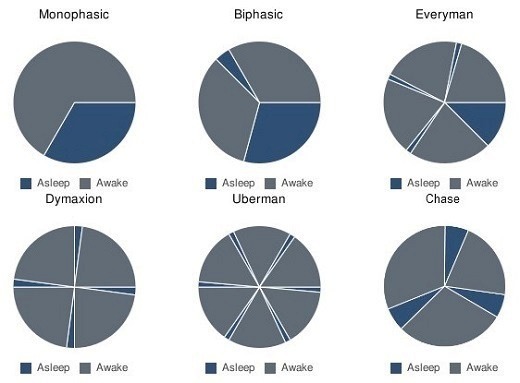Steve Pavlina polyphasic sleep experiment is one of Steve’s most well-documented trials.
Polyphasic sleep, which was coined by psychologist J.S. Szymanski in the early 20th century, is the practice of sleeping several times within a period of 24 hours. Usually, a person who is practicing this method sleeps more than twice. If he or she sleeps only twice, it is called biphasic sleep.
The usual routine of sleeping once within a 24-hour period, on the other hand, is called monophasic sleep.
How it works
More recently, polyphasic sleep gathered some publicity in the online community when Steve Pavlina experimented with it as a method to achieve more time awake every day.
Steve’s interest in polyphasic sleep began when he saw a post about it on the website LifeHack.org. His basis for his experiment is the Uberman sleep schedule, where a person sleeps six times per day, with each session lasting only 20 to 30 minutes, and naps every four hours.
In summary, a person using this schedule will sleep only 2 to 3 hours during the day.
In Steve’s experiment, he slept at:
- 02:00 AM
- 06:00 AM
- 10:00 AM
- 02:00 PM
- 06:00 PM
- 10:00 PM
Each time for only 20 to 30 minutes.
Since the times are the same regardless of whether it is AM or PM, the schedule is easy to remember and is very consistent day to day.

But what about REM?
REM, which is known as the most important phase of sleep, tends to occur late in the sleep cycle.
Those using a polyphasic sleep schedule don’t have to worry about being deprived of REM sleep, though, because one of the objectives of this schedule is to teach the body to enter REM sleep immediately. This way, even if you sleep for short periods, you will get enough REM sleep.
Based on Steve’s experiment, polyphasic sleep took around a week of adjustment, during which you will certainly feel a bit sleep-deprived. But after the adjustment period, you will begin experiencing REM sleep earlier during the sleep cycle and will therefore not be deprived anymore.
Steve warns, however, that a lot of self-discipline is necessary to adopt polyphasic sleep, and that since your sleep times are only limited, it is important that you sleep at the required times and that you do not miss a single nap. Also, this method is certainly not advisable for those whose schedule is not flexible, due to his work or lifestyle.
Benefits
People who have tried the polyphasic sleep schedule have reported several benefits, such as higher alertness levels, higher energy, more vivid dreams, and more lucid dreams. But the main benefit is that it gives people more free time – about 30 to 40 hours every week – during the day. In fact, this is what convinces people to try polyphasic sleep.
Many people, however, also failed in their experiment because they sometimes missed naps and tended to oversleep.
Side Effects
People who follow the polyphasic sleep schedule will also have more time to spend for their activities. Since they spend more time moving about, they tend to want to eat more.
Polyphasic sleep also has its critics, such as psychologists and software entrepreneur Piotr Wozniak, who said that the brain does not have the right control mechanism that can adapt to polyphasic sleep.
These critics say that the body tends to consolidate sleep into one large block of time. According to them, this may cause some health problems such as sleep deprivation and circadian rhythm sleep disorders.
Steve experienced none of these health problems during and after his experiment, but he did retain some long-term effects.
Long-Term Consequences
In Steve Pavlina polyphasic sleep experiment, he noticed that it helped him fall asleep more quickly, even years after he ended the experiment. Since sufficient time has passed, Steve considers this as a permanent effect of his trial.
In his blog entry a year after his experiment, Steve recounted several instances when he would fall asleep in just a second. In fact, there were times when he and Rachelle would be talking and he would suddenly fall asleep during a slight gap in the conversation. According to Steve, this has happened so many times that he does not think it is normal or was just a coincidence. Also, he noticed that this never happened before he tried polyphasic sleep, which confirms the relationship between the two.
In Steve’s case, he didn’t consider it as a negative consequence, but he does WARN those who wish to try polyphasic sleep that doing so may cause long-term effects that may not be positive for them.